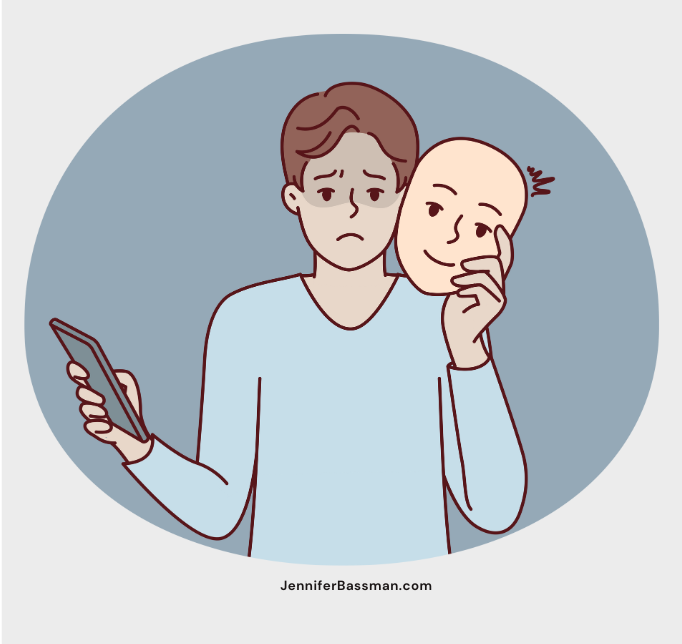There is a reason I wrote a book about being a doormat – I was one. (Not the funny kind that says something like “No need to knock. We know you’re here. Love, The Dogs.)
Even though I have been working on my boundaries for a decade, they (and I) will always be a work in progress.
A major part of my boundary journey has been working on being way too nice. And, by way too nice, I mean waaaaay too nice.
- You want me to host a dinner party tomorrow? Piece of cake!
- You need me to take on a client that isn’t working out for you? Send ‘em over!
- You’re too busy to organize lunch for the group? I’ll do it!
- You need me to be there early and stay late? No problem!
- You can’t afford to pay my rates? That’s okay!
It was no surprise that I woke up and realized that I had become very resentful and angry. I was exhausted and felt like no one really cared about me or what I wanted. I felt used because I couldn’t seem to get people to reciprocate a favor. Even the smallest of favors.
Ready to recover from burnout? Get the best recovery solutions delivered to your email inbox.
Being Way Too Nice Cost Me My Identity
The worst part of all of this – in my opinion – it kicked off an identity crisis because I had lost the sense of who I was, what I wanted, and my own opinions. It has been a struggle over the last decade to figure that out, and I have mostly figured it out by identifying what I don’t want.
Call it being way too nice. Call it being a people pleaser. Whatever you and I want to call it, being overly amenable to others usually leads to resentment, anger, exhaustion, and burnout. Being too nice can also make having honest, vulnerable relationships impossible because you don’t know who you are or what you need.
Being way too nice is a learned behavior, habit, and mindset that usually stems from past experiences with rejection. Maybe you shared your opinion and it wasn’t well received, you have a toxic family history, or you are uncomfortable with the possibility of letting other people down.
I’m even sweating a little bit typing those things because I have also found presenting myself as an authority, a thought leader, or an expert incredibly uncomfortable. What if you don’t like what I have to say? What if you think I’m stupid? What if you don’t like me?
I would love to say the answers to those questions don’t bother me, but I am a people pleaser and a perfectionist at my core. So, I will always have to work to manage my fears around sharing my thoughts for the world to scrutinize.
Being Way Too Nice Doesn’t Pay Off The Way You Want
There is nothing wrong with being nice, but it needs to be on your own terms. For many of us super nice people, it’s usually not.
Being too nice is not very rewarding and it often means we don’t show up as our authentic selves because we fear rejection. When it becomes habitual and we constantly put our own needs to the side, it becomes unhealthy.
You may have never learned how to voice what you really want. And, you may be in the habit of being agreeable and going along with what other people want to the point you don’t actually know what you think or want.
Find Your Authenticity
I know there are some of you reading this thinking that you like being a nice person. We are supposed to be helpful. It’s what the world wants us to be, right? But, you may also be exhausted, live with a packed schedule, hate saying no, and would rather have a root canal that confront someone for treating you poorly.
Kicking your people pleasing habits to the curb is hard. You are going to feel anxious and guilty. You are going to feel like you have let someone down. However, the more you practice putting your own needs first and giving others what is left over – which sometimes may be nothing – those feelings will lessen.
No one likes saying no when they are needed. But the reality is your needs have to come first so that you can be present for the ones you love and feel taken care of so you show up as your best, authentic self.
People like you more when they know they are getting the real you.
13 Signs You Are Way Too Nice
Here are 13 signs you are waaaaay too nice and what to do about it. One, a few, or all may resonate:
- Your Needs Are Rarely or Never Met: Nice people tend to attract users – people who are lazy or are always asking for something from you. It’s okay to be helpful, but the favor asking crosses into bad territory when these same people are never there for you in return. Here is the interesting thing about this sign – it trains people to let you down because they know you won’t call them out on it.
Other clues include your goals never being met and you not having enough energy or time to get your own work done.
What to do about it: Start prioritizing yourself and your own happiness. You can still help others, but start with your own needs first. Eventually, you will strike a better balance.
- You Feel Resentful After You Say Yes: If you constantly do things to make others happy, because you want to be liked, and not because you genuinely want to – you will become resentful. When you have no time for yourself or no energy to accomplish your own goals, you feel left behind and left out. You lack a sense of fulfillment.
What to do about it: Practice saying “no.” There doesn’t need to be a reason or an excuse attached. That could open the door for negotiation or guilt. A simple “no, I can’t do that” is enough. Reserve your “yeses” for the things and people who truly matter to you. - You Worry About Being Liked: People pleasers often adopt the script that “people will only like me if I’m useful to them.” This is a way of alleviating their own anxiety about doing things they don’t really want to do.
What to do about it: Look for small situations where you can practice saying no. A situation that has little to no risk. “Would you like seconds?” “Can you stop at the store to pick up XYZ before you come over?” Start building a list of situations that are difficult for you to say no, and practice a response. - You’re Constantly Swamped At Work: If you are trying to be a team player by accepting work you don’t have time for, or attending meetings that have nothing to do with you, I bet you find yourself overwhelmed frequently at work. Being the Queen of Yes usually only gets you a packed schedule, no time for yourself, and longer hours at work – not the accolades you are hoping for.
What to do about it: Schedule your owns needs and goals before you even consider taking on someone else’s. When you are really busy, the responsible thing to do is say “no.” - You Often Get Dragged To Do Things You Don’t Want To Do: Nice people find it hard to chime in with what they want to do, and end up going along with plans that they aren’t interested in. You feel like you are being dragged to things, which ends up stressing you out rather than relaxing you and having fun.
What to do about it: Allow yourself some “me” time and bow out of activities that aren’t appealing to you. Also, remember people aren’t mind readers. So you need to speak up and share your thoughts with others. - You Say “Sorry” On Repeat: Nice people tend to apologize for anything and everything. Have your apology radar on 24/7 is unnecessary and apologizing too often can lead the word losing its meaning.
What to do about it: Build an awareness of how often you unnecessarily apologize by doing an experiment with yourself. Try to go an entire day with out saying “sorry.” Catching yourself in the moment will reveal how often you apologize.
- You Shoot Down Your Own Ideas: Do you ever find yourself sharing an idea by starting off with the words, “This might sound stupid/crazy/dumb…” Or, you laugh things off by saying “this is just a thought.”
What to do about it – Start swallowing those self-deprecating thoughts before you utter them. If you knock your idea before people have a chance to hear it, you plant a seed about the quality of your idea and tell others you aren’t confident.
- You Often Have To Back Out Of Plans: In an effort to be nice, you quickly agree to plans without thinking or checking your schedule. This may be because you’re afraid to say no, feel guilty, and want to be liked.
What to do about it – Practice slowing down your response. You can do this by taking a deep breath before you speak – which gives you a few seconds to think and also lessens your stress response. Or, you could say “Oh! You know what? Let me think on it and get back to you. I want to make sure there aren’t any other conflicts.” Believe me, people don’t want that “obligatory” affirmation.
- People Say Rude Things To You All The Time: There is a pattern of family, friends, or colleagues who say whatever they want to you, without regard to how it might make you feel. When you are too nice, you can also be perceived as a good listener, and be the recipient of everyone else’s bad moods, mean comments, and judgmental remarks. They wouldn’t dare say these things to someone else, but you are fair game.
What to do about it – Set boundaries with yourself about what and who you will listen to. If someone violates your boundaries, you can make yourself less and less available to them. - Your Insides Don’t Match Your Outsides: Do the things you say match up with how you feel? When we feel angry, jealous, annoyed – we don’t let it show by portraying the exact opposite sentiment or answer. You do this to avoid ruffling any feathers or being confrontational.
What to do about it – There is nothing wrong with sharing your feelings or telling people what is on your mind. People will appreciate the honesty and candor from you. The next time you’re mad, instead of smiling and seething on the inside, say “You know what? I’m not okay with that.”
- You’re Exhausted All Of The Time: If you are constantly performing the role of the “nicest person on Earth,” doing things for others, and putting up with mistreatment, it can drain your energy well fast.
What to do about it – There is a huge difference between being “nice” and being genuinely kind. The more you speak up and take of yourself, the less exhausted you’ll feel.
- You Avoid Confrontation At All Costs: It’s okay if you dislike arguing or confrontation. However, letting bad things happen to you because you are too afraid to speak up or because you are worried about what someone will think of you – is not okay.
What to do about it – It’s time to stand up for yourself. This is something you can practice on your own, or with a trusted friend. Practice being assertive and saying no. This doesn’t mean you have to mean or rude.
- You Attract Needy People: Being too nice teaches others that you don’t have boundaries. When others sense or find out that you lack boundaries, you will feel like you are always mediating other people’s drama or attracting people who expect too much from you.
What to do about it: The next time someone tries to suck you into their drama, stop yourself and ask yourself if you have the time or energy to get involved. It will take time to replace this habit and the associated anxiety, but it can be done. You can learn to respond by saying things like “It means a lot to me that you trust me with this information, but I can’t talk about it right now.” You are allowed to be kind to yourself.






